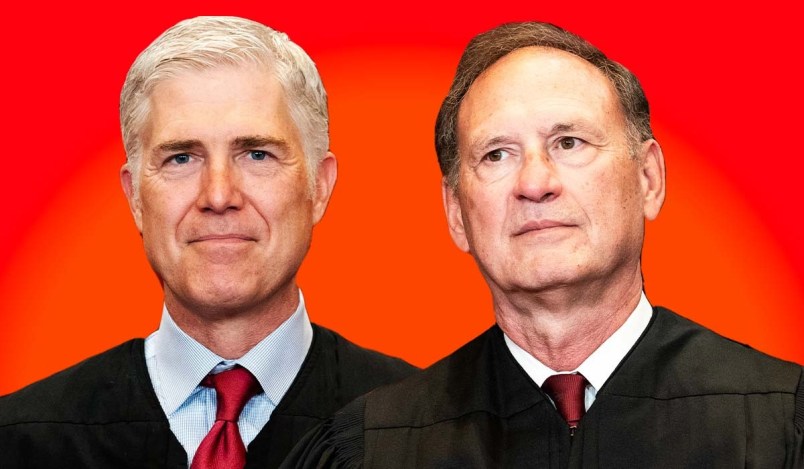While some of the conservative justices admitted that the plaintiffs Monday had strong cases against the six-week Texas abortion ban, they wrung their hands about how to remedy it.
“I think it’s a forceful argument,” Justice Samuel Alito said after Solicitor General Elizabeth Prelogar presented the ways that the Texas ban had been written to thwart legal challenges. “But I think we have to be concerned about the implications of the mechanisms that you propose for providing some kind of relief.”
During Monday’s two-and-a-half hour marathon of back-to-back oral arguments in two lawsuits against the ban, the conservative justices took issue with nearly every tactic the plaintiffs came up with to block the law, even as they expressed concern about the law itself.
The plaintiffs’ task was significantly complicated by the fact that the law was purposefully written to skirt federal judicial review. It deputizes individuals, tempted by a bounty of at least $10,000, to carry it out — depriving plaintiffs of an obvious state official to name on the suit and enjoin from enforcing it.
In both cases, one brought by abortion providers and one by the Department of Justice, the plaintiffs pointed to the Texas court system as comprised of state actors being “weaponized” to enforce the law. By enjoining the country clerks from docketing S.B. 8 lawsuits and state judges from hearing them, the plaintiffs argued, the law would be stymied without having to expose defendants to potentially ruinous fines.
Justice Clarence Thomas, finding his voice after years of silence from the bench, asked Marc Hearron, lawyer for the abortion providers, how he’d get around precedent from another case to enjoin the state judges.
Chief Justice John Roberts balked at the novelty of the remedy.
“It’s hardly traditional to get injunctions against judges, injunctions against clerks, injunctions against everybody, right? That’s part of the relief you seek, isn’t it?” he asked Prelogar. “Anybody can bring one of these suits, so you’re seeking an injunction against the world, right?”
Alito and Justice Neil Gorsuch both torqued up the emotion with their lines of questioning, showing their sympathies to be aligned with the judges and clerks who may be blocked from moving forward lawsuits against those who helped a woman get an illegal abortion.
“A woman shows up at the clerk’s office and says, I want to file a pro se complaint against the doctor who performed my abortion because it caused me physical and/or emotional harm and I want to sue under S.B. 8 because I want actual damages, but I also want the $10,000 in liquidated damages,” Alito hypothezied, asking if even in that case, a clerk should still refuse to docket the lawsuit.
Hearron said yes.
Gorsuch spun up his own hypothetical where S.B. 8 is somehow consistent with the precedent of Roe v. Wade and Casey v. Planned Parenthood that guarantees a pre-viability abortion, and imagines a massive burden on the shoulders of the poor county clerk.
“Should they file those lawsuits?” he asked. “Should they try and determine which side of the line they fall on? I mean, post-viability, not for medical reasons, you know, that would meet a Roe and Casey test? Are they supposed to apply Roe and Casey themselves?”
Gorsuch, champion of the clerks, also repeatedly brought up a hypothetical where one could be found in criminal contempt for improperly docketing S.B. 8 lawsuits.
Having questioned the legitimacy of suing clerks and judges, Gorsuch eagerly expanded on Roberts’ “can you sue the world” quip to expand his hypothetical to celestial heights.
“General, are you aware of a precedent that permits an injunction against all persons in the country or the world, the cosmos, who bring suit?” Gorsuch asked Prelogar incredulously.
“In the history of the United States, you can’t identify one for us, right?” he pushed on.
“In the history of the United States, no state has done what Texas has done here,” Prelogar responded.



